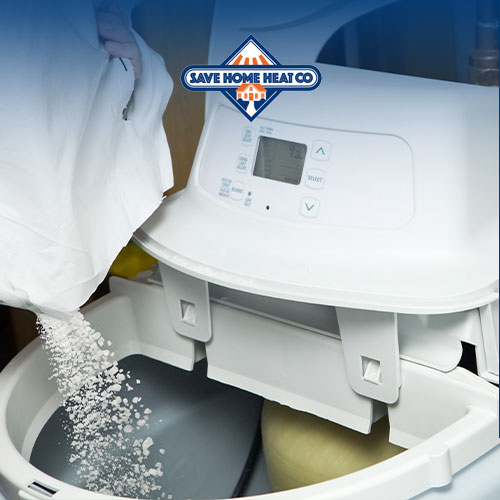Reviewing Water Softener Utility and Technology
 A whole-house water softener can be an invaluable tool for your home and your quality of life. ‘Hard water’ is a problem for many households and having a water softener installed in your home can make quite a difference. However, before diving right into an investment, our team at Save Home Heat Company advises performing your due diligence by learning as much as you can about these products, as well as consulting with a team of experts like ours to ensure you make the right decision for you and your home.
A whole-house water softener can be an invaluable tool for your home and your quality of life. ‘Hard water’ is a problem for many households and having a water softener installed in your home can make quite a difference. However, before diving right into an investment, our team at Save Home Heat Company advises performing your due diligence by learning as much as you can about these products, as well as consulting with a team of experts like ours to ensure you make the right decision for you and your home.
What Is ‘Hardness’ In Our Water Supply?
Minerals that may be found in our water supply, most commonly calcium and magnesium, are the culprits that define water ‘hardness.’ If present in significant enough levels, hardness can create a host of issues in your home, some of which can lead to costly repairs. Others can be seen as more of an annoyance that affects your quality of life.
Hard water can cause a variety of issues, such as drying out your skin and hair, and causing premature failure of automatic water valves in dishwashers, icemakers, water dispensers, and washing machines. Hardness in your water can also adversely affect the performance and life expectancy of your water heater, as well as faucet seats and seals, and shower and faucet aerators all around your home. It also makes it harder for soap to be as effective as you’d like when hand-washing pots and pans, bathing, and simply washing your hands and face. Excessive soap scum deposits are also associated with hard water. In addition, hardness can even adversely affect the copper piping that delivers water to all parts of your home, indoors and out.
Whole-House Water Softeners To The Rescue!
 Water softeners are designed specifically to remove hardness from your home’s water supply. The process by which they perform their job is called ‘ion exchange,’ which creates a chemical environment in the softener that draws those problematic minerals from your home’s water into the softener.
Water softeners are designed specifically to remove hardness from your home’s water supply. The process by which they perform their job is called ‘ion exchange,’ which creates a chemical environment in the softener that draws those problematic minerals from your home’s water into the softener.
During operation of the water softener, a negative electrical charge is created in the salt materials in the unit, attracting the positively charged mineral molecules in your household water supply, and capturing those hard minerals in the softener. The softener contains interior tanks and valving to control the process inside the unit. It’s a relatively simple process but requires specific conditions in the softener in order to be effective at solving your hard water problems.
Does a whole-house water softener make sense for my home?
Water Softener Routine Maintenance
While water softeners incorporate a partially self-cleaning, regenerating design, in addition to routine annual maintenance they require the regular addition of an appropriate salt – typically sodium chloride or potassium chloride – to allow the unit to continue doing its job. Some of our readers may recognize sodium chloride as regular table salt, but table salt is NOT appropriate for use in water softeners, primarily because the smaller size of table salt crystals can create performance issues for the softener. The salts used in water softeners are normally referred to as salt beads, or pellets, and reside in the unit in what’s referred to as the ‘resin bed.’
Annual maintenance of your water softener is also required, with procedures focusing on cleaning resin beds, valves and tanks in the unit. If this important routine maintenance is neglected, the effectiveness of your whole-house water softener can be dramatically reduced, defeating the purpose of installing the product in the first place.
Water Testing and Analysis: Always The First Step
Of course, before any discussion of whole-house water softeners can commence, the first step is to gain a better understanding of the nature of what’s in your home’s water. Once the step is made, professional recommendations can be tailored to your specific needs. Save Home Heat Company provides in-house water testing and analysis services, and also works with highly reputable area laboratories if more in-depth analysis of your water is required.
Water softeners can help you by:
- Reducing or removing soap scum from sinks and bathtubs
- Reducing water spots on dishes, glasses and pots that have just been washed
- Reducing or eliminating white powdery deposits that collect on faucet and showerhead aerators
- Improving the quality of the water you drink and use for a wide variety of purposes around your home
- Reducing the impact of minerals on many plumbing appliances, helping extend the life expectancy of those appliances and associated piping
- Helping maintain the performance and life expectancy of water heaters
Consult the Professionals
 By choosing the right whole-house water softener for your home, and having proper routine maintenance performed on the unit, you can expect years of reliable filtration and significantly improved water quality for you and all your household plumbing needs.
By choosing the right whole-house water softener for your home, and having proper routine maintenance performed on the unit, you can expect years of reliable filtration and significantly improved water quality for you and all your household plumbing needs.
Save Home Heat Company installs high quality water softeners, and provides full service and annual maintenance for a broad range of product brands and designs. In the Denver-Boulder metro area, our team of skilled plumbers are happy to provide you with more information and answer all your questions about residential water softeners, the installation process, annual maintenance, and other any other related questions you may have.
Save Home Heat’s plumbing team has decades of experience meeting the needs of our many happy customers. As always, we are glad to provide friendly, low-pressure advice and recommendations about water softeners or for any of your other household plumbing needs. To learn more about having a water softener installed in your home, or for other plumbing assistance, please contact our team today.
Please contact me to schedule a free water softener install quote, or to schedule plumbing service!




